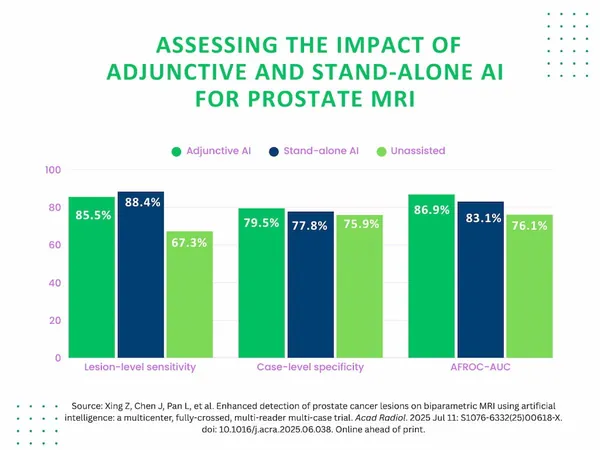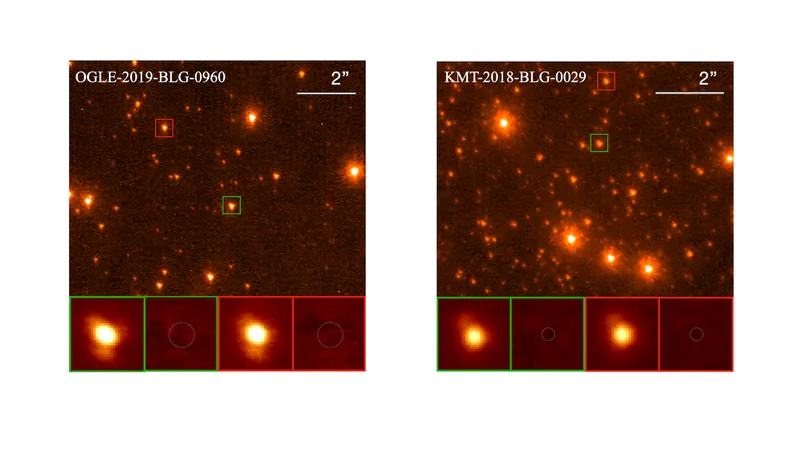
Breakthrough AI Enhances Prostate Cancer Detection by 18%
2025-07-15
Author: Nur
Revolutionizing Prostate Cancer MRI Detection
Recent research has unveiled that the integration of artificial intelligence (AI) in prostate MRI scans significantly boosts the detection of prostate cancer (PCa) lesions, outperforming traditional radiologist assessments. This innovative approach promises to transform how we diagnose this prevalent disease.
Groundbreaking Study Details
Published in Academic Radiology, the multi-reader, multi-case study employed a cutting-edge deep learning model (uAI-prostateMR) trained on 1,688 biparametric MRI sequences. With participation from 407 patients, whose average age was 69.5, and ten radiologists boasting an average of three years of experience, the findings are both promising and clear.
The use of adjunctive AI revealed an impressive 85.5% lesion-level sensitivity for detecting PCa, a stark contrast to the 67.3% sensitivity rates observed in unassisted interpretations by radiologists.
Exceptional Performance with Small Lesions
One of the study's standout revelations was the AI's superior capacity to detect smaller cancer lesions. For lesions smaller than 1 cm, stand-alone AI achieved an astounding 82.6% sensitivity, compared to just 38.3% for radiologists working without AI assistance. This highlights AI's critical role in identifying potentially missed cancers at their most treatable stages.
Important Takeaways from the Study
1. **Significant Sensitivity Boost**: AI assistance elevated lesion-level sensitivity for PCa detection from 67.3% to 85.5%, coupled with a slight increase in specificity and diagnostic accuracy.
2. **Effectiveness in Small Lesions**: The AI platform notably excelled in detecting small lesions, underlining its potential in routine clinical applications.
3. **Support for Clinical Use**: Despite some limitations, such as a controlled testing environment and restricted MRI vendor representation, the study strongly supports AI's role in enhancing prostate cancer localization and detection.
The Future of AI in Medical Imaging
Noteworthy is that for larger lesions over 3 cm, AI still proved beneficial, showing a 6.6% higher sensitivity compared to traditional interpretations. This underlines the technology's overall effectiveness in cancer diagnostics.
As Dr. Zhaoyu Xing and his colleagues emphasize, these findings not only illustrate AI's capability in transforming prostate cancer detection but also signal a significant advancement in the precision of medical imaging. With ongoing research and development, the potential for AI-assisted tools in healthcare is more promising than ever.



 Brasil (PT)
Brasil (PT)
 Canada (EN)
Canada (EN)
 Chile (ES)
Chile (ES)
 Česko (CS)
Česko (CS)
 대한민국 (KO)
대한민국 (KO)
 España (ES)
España (ES)
 France (FR)
France (FR)
 Hong Kong (EN)
Hong Kong (EN)
 Italia (IT)
Italia (IT)
 日本 (JA)
日本 (JA)
 Magyarország (HU)
Magyarország (HU)
 Norge (NO)
Norge (NO)
 Polska (PL)
Polska (PL)
 Schweiz (DE)
Schweiz (DE)
 Singapore (EN)
Singapore (EN)
 Sverige (SV)
Sverige (SV)
 Suomi (FI)
Suomi (FI)
 Türkiye (TR)
Türkiye (TR)
 الإمارات العربية المتحدة (AR)
الإمارات العربية المتحدة (AR)